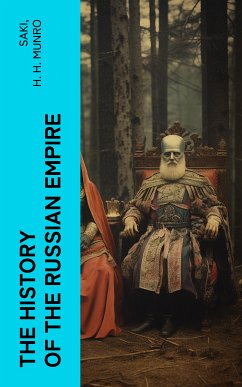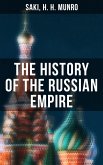This eBook edition of "The History of the Russian Empire" has been formatted to the highest digital standards and adjusted for readability on all devices. The Rise of the Russian Empire is a historical study on Russian history, written by Hector H. Munro. The Book covers the period from the 9th century and the dawn of Russian empire, to 17th century and the rise of the Romanov dynasty.
Dieser Download kann aus rechtlichen Gründen nur mit Rechnungsadresse in A, B, BG, CY, CZ, D, DK, EW, E, FIN, F, GR, H, IRL, I, LT, L, LR, M, NL, PL, P, R, S, SLO, SK ausgeliefert werden.









